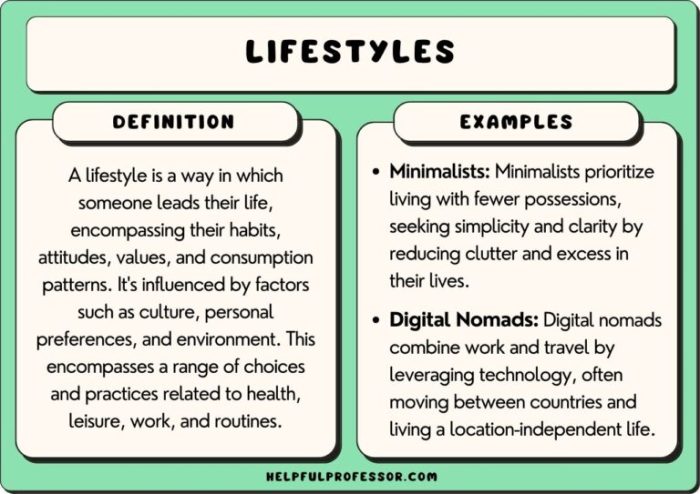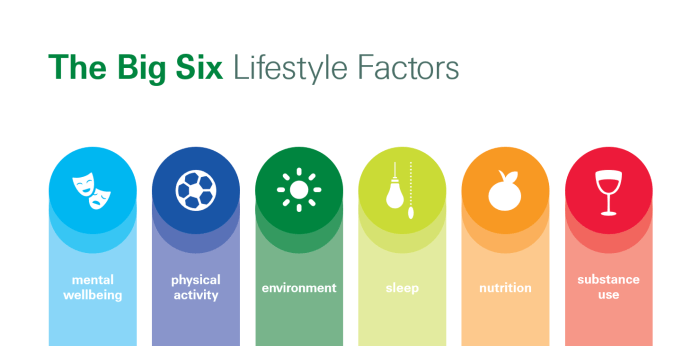The Intersection of Style, Income, and Lifestyle Direct Goals sets the stage for this enthralling narrative, offering readers a glimpse into a story that is rich in detail and brimming with originality. From exploring how style choices reflect personal values to delving into the impact of income levels on fashion accessibility, this topic covers a wide array of intriguing aspects that shape our daily lives.
Style
Style is more than just what we wear; it's a reflection of our personal values and beliefs. Our clothing choices can communicate a lot about who we are and what we stand for.
Impact of Culture on Fashion Trends
Cultures around the world have a significant influence on fashion trends. For example, traditional African prints have become popular in Western fashion, showcasing a blend of cultures and styles.
Role of Social Media in Shaping Style Preferences
Social media plays a crucial role in shaping modern style preferences. Platforms like Instagram and TikTok have become hubs for fashion inspiration, with influencers and celebrities setting trends that quickly catch on.
Income
Income levels play a significant role in determining an individual's access to certain fashion brands. The amount of money one earns can dictate whether they can afford high-end luxury items or if they need to stick to more affordable options.
Let's delve deeper into how income intersects with the world of fashion.
Luxury Versus Affordability
Luxury fashion brands are often associated with high price tags, exclusivity, and status symbols. Those with higher incomes may have the means to purchase these luxury items without much thought, while those with lower incomes might have to save up for a long time or forego these brands altogether.
On the other hand, affordable fashion brands cater to a wider range of incomes, making trendy and stylish clothing accessible to a broader audience. The choice between luxury and affordability in fashion is often influenced by one's income level and personal preferences.
Rise of Sustainable Fashion
The concept of sustainable fashion is gaining traction in the industry, with more brands focusing on ethical production practices, environmentally-friendly materials, and fair labor conditions. However, sustainable fashion often comes with a higher price tag due to the costs associated with responsible sourcing and production.
This can create a disparity in access to sustainable fashion based on income levels. Those with higher incomes may be able to prioritize sustainability in their fashion choices, while those with lower incomes may find it challenging to afford sustainable options.
The rise of sustainable fashion highlights the complex relationship between income disparities and ethical consumerism in the fashion world.
Lifestyle
Our lifestyle choices play a significant role in shaping our personal style. The way we live, our daily routines, hobbies, and social activities all contribute to the way we dress and present ourselves to the world.
Professions and Dress Codes
Various professions and industries dictate specific dress codes that employees must adhere to. From the formal business attire required in corporate settings to the more casual dress codes in creative industries, our professional lives often influence our style choices.
Impact of Technology on Fashion Trends
Technology has revolutionized the way we live and has had a profound impact on lifestyle-related fashion trends. The rise of social media platforms, online shopping, and influencer culture has transformed the way we discover and adopt new styles, leading to rapid shifts in fashion trends.
Direct Goals

Setting style goals can greatly enhance self-confidence and self-expression
By aligning your style choices with your personal and professional goals, you can project a cohesive image that reflects your values and ambitions. Additionally, adopting the concept of capsule wardrobes can streamline your daily dressing routine and make it easier to achieve your style goals efficiently.
Enhancing Self-Confidence and Self-Expression
- Define your personal style aesthetic to guide your clothing choices.
- Experiment with different looks to discover what makes you feel most confident.
- Invest in quality pieces that make you feel good when you wear them.
- Accessorize thoughtfully to add personality to your outfits.
Aligning Style Choices with Goals
- Consider the image you want to project in different aspects of your life.
- Choose clothing that suits your body type and complements your skin tone.
- Adapt your style to different settings, such as work, social events, and leisure activities.
- Invest in versatile pieces that can be mixed and matched for various occasions.
Relevance of Capsule Wardrobes
- Curate a collection of essential pieces that can be easily combined to create multiple outfits.
- Focus on quality over quantity to build a wardrobe that reflects your style goals.
- Reduce decision fatigue by simplifying your choices and creating a cohesive wardrobe.
- Embrace a minimalist approach to fashion that emphasizes quality, versatility, and personal style.
Ultimate Conclusion

In conclusion, The Intersection of Style, Income, and Lifestyle Direct Goals intricately weaves together various elements that play a crucial role in defining our individuality. By understanding the connections between style, income, lifestyle, and personal goals, we embark on a journey of self-discovery and empowerment, where each choice we make reflects a deeper part of who we are.
Query Resolution
How do style choices reflect personal values and beliefs?
Style choices often mirror our inner values and beliefs, acting as a form of self-expression that communicates aspects of our identity to the world.
What is the connection between income levels and access to fashion brands?
Income levels can significantly impact an individual's ability to purchase from certain fashion brands, as luxury items may be out of reach for those with lower incomes.
How can lifestyle choices influence personal style?
Lifestyle choices, such as profession or hobbies, can shape our style preferences by dictating the type of clothing that suits our daily activities.
Why are capsule wardrobes relevant to achieving style goals?
Capsule wardrobes offer a curated selection of versatile pieces that align with personal style goals, promoting a more intentional and sustainable approach to fashion.









